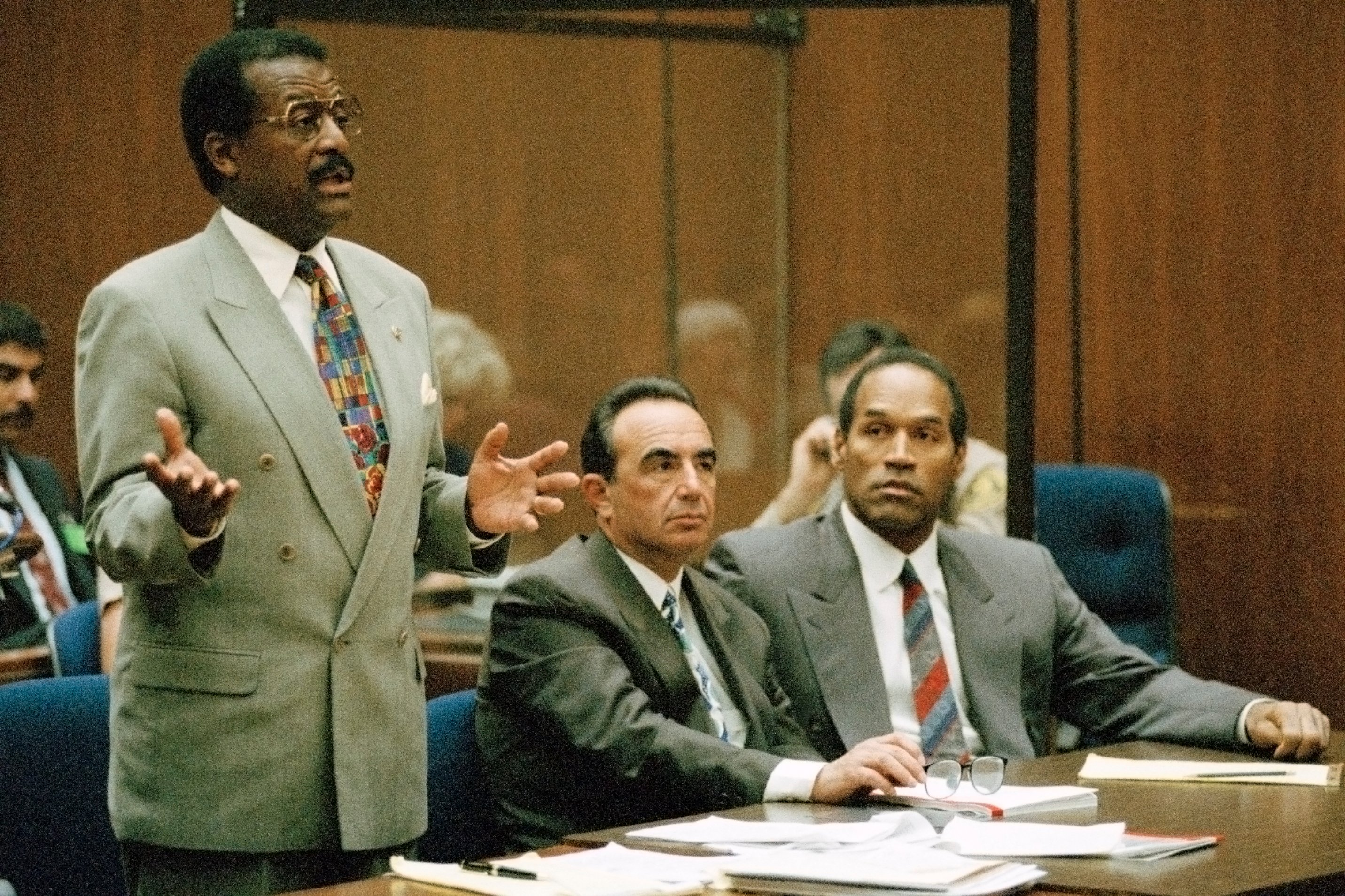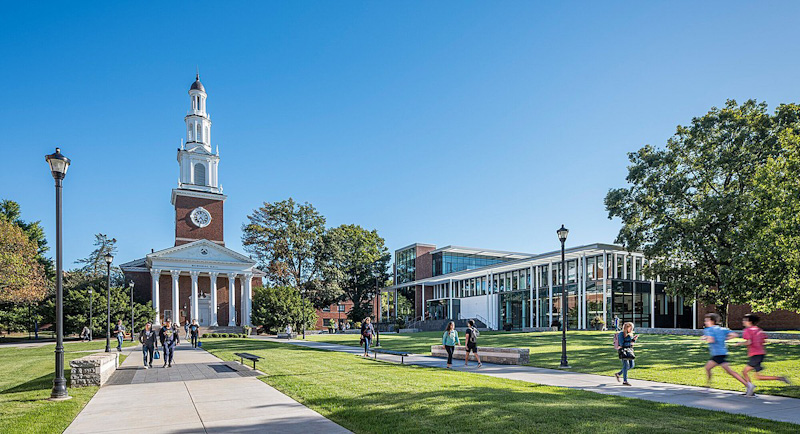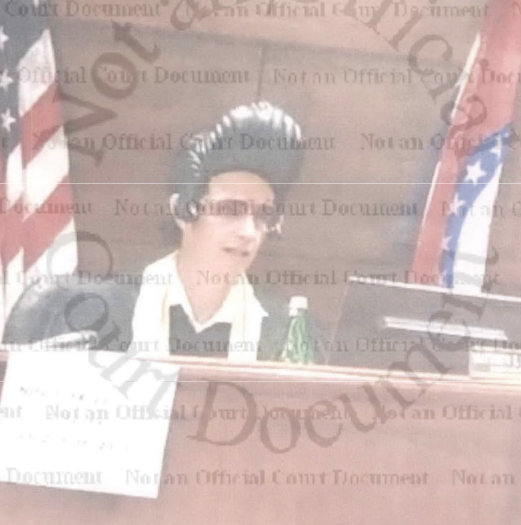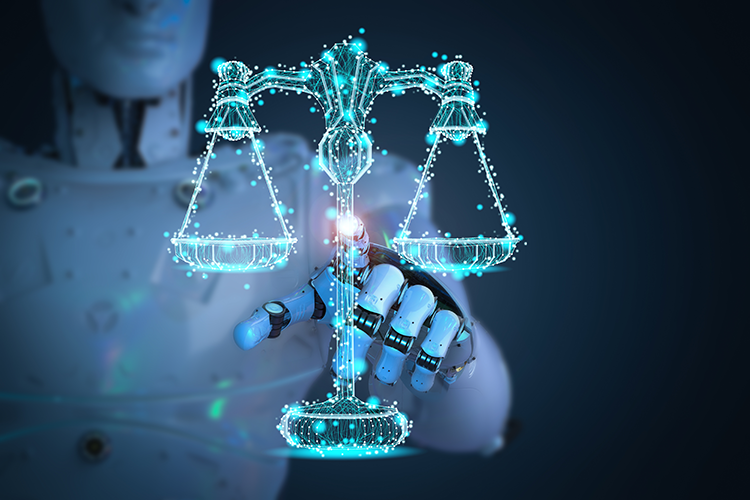
Social media and your legal career


Law in Popular Culture
Lawyer Johnnie Cochran Jr. addresses the court during a hearing for professional football player O.J. Simpson in Los Angeles on July 29, 1994. (Photo by Nick Ut/The Associated Press)
The estate of former professional football player O.J. Simpson has approved a $58 million claim filed by the father of Ron Goldman, who was fatally stabbed along with Simpson’s ex-wife Nicole Brown Simpson in 1994.
Simpson was acquitted of the murders in 1995, but he was found liable for $33 million in a civil lawsuit filed by the victims’ families in 1997. The Goldman family collected only a small part of the award, and Ron Goldman’s father, Fred Goldman, is also unlikely to recover much from the estate, report the Los Angeles Times, WATE and the Associated Press.
The estate is valued at less than $600,000, and administrative expenses and an IRS debt must be paid first. The $58 million claim represents the balance due to the Goldmans plus interest.
“There’s no guarantee the estate has or will have the funds to pay this amount, or even any portion of it,” said Fred Goldman’s lawyer, Michaelle Rafferty, in an interview with the Los Angeles Times.
The estate’s value had been bolstered by the auction of items that included a replica of Simpson’s Heisman Trophy and a Bible given to him by Robert Kardashian, one of his defense lawyers in the murder trial. Kim Kardashian revealed on an episode of The Kardashians that she was the bidder who paid $80,000 for the Bible that had been owned by her father, TMZ reports.
Simpson went to prison after being found guilty in 2008 for an armed robbery in which he sought to acquire sports memorabilia that he claimed had been stolen. He died of prostate cancer at age 76 in April 2024.
See also:
Slain Victim’s Kin Own OJ Book Rights
F. Lee Bailey holds forth on Mueller report and reason for OJ Simpson’s murder acquittal
Write a letter to the editor, share a story tip or update, or report an error.

Law Professors
The University of Kentucky J. David Rosenberg College of Law in July 2022. (Photo by LawAnalyzer40526, CC-BY-SA-4.0, via Wikimedia Commons)
A University of Kentucky law professor who has called for military action against Israel has filed a lawsuit claiming the school violated his constitutional and civil rights when it suspended him from teaching and launched an investigation to determine whether he created a hostile environment.
Tenured law professor Ramsi Woodcock alleges the university violated his constitutional rights to freedom of expression and procedural due process and discriminated against him in violation of the Civil Rights Act of 1866.
Reuters, Inside Higher Ed, the Guardian and Fox News are among the publications with coverage.
According to the Nov. 13 lawsuit, filed in U.S. District Court for the Eastern District of Kentucky, Woodcock has spoken out “against Israeli colonialism, apartheid and genocide at academic conferences and on law faculty email listservs,” including through a petition for military action that he posted online. “In his view,” the lawsuit says, Israel “must be brought to an end.”
The lawsuit claims a definition of antisemitism adopted by the International Holocaust Remembrance Alliance violates the First Amendment when applied by the university in disciplinary proceedings or when used in federal enforcement of an anti-discrimination law.
“To the extent that the IHRA definition prohibits calling for the dismantling of colonial state structures, prohibits legal scholars from debating the contours of the right of self-determination, prohibits allegations of race discrimination, and prohibits allegations of genocide, the IHRA definition is unconstitutional,” the suit says.
A joint resolution passed by Kentucky lawmakers requires public universities to use the definition even though it “characterizes broad categories of constitutionally protected speech critical of Israel as antisemitic,” the lawsuit states.
Woodcock has been sharing his views outside the classroom since 2024 without consequence. That changed in the summer of 2025, the lawsuit says, following passage of the joint resolution and federal threats to withdraw funding from universities.
Lawsuit defendants include University of Kentucky president Eli Capilouto, law dean James Duff and U.S. Education Secretary Linda McMahon.
The lawsuit identifies Woodcock as “a founder of the inframarginalist movement in law and economics, which applies the methods of law and economics to the problem of wealth inequality.” He teaches courses mostly in the areas of business and commercial law.
He is represented by the Council on American-Islamic Relations, Kapitan Gomaa Law and Hawks Quindel, according to a CAIR press release.
University of Kentucky spokesperson Jay Blanton gave statements to several publications saying Woodcock had been “reassigned” but not suspended during the investigation.
“If someone’s views as stated threaten the safety and well-being of the university’s students and staff, we are obligated to act to protect our community and our people,” Blanton told the Guardian. “That’s clear under Title VI of the federal Civil Rights Act of 1964. We have an obligation to find out if that’s the case.”
Write a letter to the editor, share a story tip or update, or report an error.

Ari Kaplan recently spoke with Brian Powers, the co-founder and CEO of Markups.ai, a company that created an AI agent called Agent Marko to draft, revise and analyze contracts from clients’ inboxes with no new platform required, and Debbie Epstein Henry, the founder of DEH Consulting, Speaking, Writing and the chief strategic adviser to Markups.ai.
They discussed the advantages of using an AI agent in contract review, where startups can distinguish themselves in a crowded market, the misconceptions about AI that leaders need to address before they can achieve broad adoption, and the skills legal professionals should enhance to fuel their success.
Ari Kaplan: Tell us about your background and the genesis of Markups.ai.
Brian Powers: I started my career in investment banking at Moelis in New York, and like any good analyst, I had my fair share of NDAs. Then I founded a company called TemperPack, which makes sustainable materials to replace plastics like Styrofoam, and we grew it to over a hundred million in sales. We sold quite a bit of it to private equity firms led by Goldman Sachs a few years ago. Along the way, we were frequently challenged on our contracts. We had many large clients across different sectors, and we had lots of good solutions for storing contracts but nothing to assist with the actual negotiations. My co-founder at Markups.ai, Sam Shelley, began his AI career at Dataminr over a decade ago, then started Vault Health, which became one of the largest COVID testing telemedicine businesses. In 2023, we teamed up with the idea of using the latest AI technology that had recently emerged to help automate contract negotiations, aiming to do so without onboarding a new platform and making the process more customized and user-friendly.
Ari Kaplan: Tell us about your background and your role as chief strategic adviser for Markups.ai.
Debbie Epstein Henry: I call myself a recovering lawyer turned professional speaker, communication coach and entrepreneur. What’s more relevant to my background for today’s conversation is that I co-founded a company called Bliss Lawyers, which was a secondment firm. I ran that company with two other partner co-founders for nearly nine years, and then we were acquired by our biggest competitor, Axiom, in February 2020. So I was actually out of legal innovation for a while before joining Markups.ai as chief strategic adviser. For the company, I mainly speak to prospective clients daily as they evaluate different AI tools, which every company and firm is doing right now. I also advise Markups.ai on trends in the legal profession because our two co-founders aren’t lawyers and need to stay informed about what’s happening in the field. We discuss current trends and what clients expect from their outside service providers.
Ari Kaplan: Why did you design Markups.ai to work with an agent, rather than the more common approach to using AI to manage contracts?
Brian Powers: Some of it was what we believed was missing in the market, but there were also three major reasons that motivated us to create and use a product like this. First, we wanted something that was much easier to onboard. I still get shudders when I hear the word “platform”—that means my next year’s plans are disrupted, and it will be a long wait before we see any benefits. Second, I wanted something more intuitive to use, especially with AI, that is easy to operate but also really powerful. Our goal from the start was to create something so simple that even my two lawyer parents could use it. Third, we aimed for something far more customizable than most software platforms. Most platforms are designed to fit many different businesses doing similar things, but there was an opportunity to develop something that could handle highly tailored work. For the first time, AI-powered software could achieve this, with an agent doing the work. We develop a new version of our agent for each client, ensuring everything they do is uniquely customized.
Ari Kaplan: What is most important for legal tech startup founders to consider in the current market?
Debbie Epstein Henry: The primary consideration should be workflow. The main obstacle to AI adoption is when an AI tool doesn’t easily fit into a company’s existing workflow. That’s why our engineers at Markups.ai developed an email agent because email is the most natural and straightforward integration point. This isn’t just based on our experience; it’s backed by two recent studies, one by McKinsey and the other by MIT. Ultimately, it’s all about simplifying workflow and seamlessly integrating with existing company systems.
Ari Kaplan: What are the advantages of using an AI agent in contract review specifically?
Brian Powers: The two holy grails are one that saves time and also makes you better at your job. AI, straight out of the box, is effective at simple tasks, but most work people do, especially lawyers and legal professionals, is very complex and customized. AI often struggles with these more challenging tasks, and since that makes up most of what legal teams do, AI hasn’t yet become as useful as it could be. We find that when you properly train AI and create a more active agent, it can assist with more complex tasks. This allows AI to support more parts of your job, not just basic tasks like search and summaries. Our Agent Marko is depicted as a duck, gliding effortlessly on the surface, but paddling like crazy underneath. That’s exactly how working with Agent Marko feels. It’s as simple as sending an email or high-level request for a contract review, but behind the scenes, thousands of prompts run on hundreds of custom instructions written by our lawyers for each client, using the most powerful reasoning models available. That paddling under the surface makes everything seem easy above.
Ari Kaplan: Where can startups most easily distinguish themselves?
Debbie Epstein Henry: Start by understanding what your audience wants. We find that unless you’re designing a service and a tool that truly speaks to your audience, you’ll be at a disadvantage. For example, in our case, we study what clients want in the in-house legal department space. We know they want flat fees. We know they want unlimited users and usage because if we develop a great product that everyone on their team wants to use, the last thing we want is to hinder their use of that tool or have colleagues compete with each other. So the first step is understanding your audience’s needs. The second is to offer a service, rather than just be a software provider. You heard Brian talk about the importance of customization. As AI tools improve, they learn their clients’ preferences and requirements. Providing that customization is essential. The third step is being smart about defining who should do what kinds of work; where you want people involved; where their value lies; and where AI adds value, leveraging the strengths of both. In our case, we have former practicing lawyers on our team, whom we call lawyer-prompt engineers. They communicate with our clients, train our agents to build custom AI playbooks, and handle updates by incorporating client feedback and testing documents to ensure AI playbooks are accurate and current. We rely on the strengths of the team to be truly effective.
Ari Kaplan: What are the misconceptions about AI that leaders need to address before they can achieve broad adoption?
Brian Powers: There are two conflicting misunderstandings, both of which lead to disappointment. One is the belief that AI can do everything straight out of the box, which often results in frustration. The first time you use it, it feels absolutely magical to ask a question and receive an intelligent response. Everything else that could do that was a human. So you assume it can do everything a smart human can do, but you start encountering real limitations when you ask it to do something more customized or complex. The other misunderstanding is that AI can only handle very simple tasks, no matter what you do with it, leading to missed opportunities to leverage AI’s full potential. We see that the reality is a blend of these two ideas. AI chatbots using the models directly are really useful for questions, research, summaries and similar tasks, but for more complex jobs, you need to specify everything you care about and give detailed instructions. That’s exactly what we do at Markups.ai. We provide Agent Marko with hundreds of fully customized instructions for each client’s routine negotiations, enabling it to handle complex agreements faithfully. However, it requires quite a bit of effort, and that’s where we aim to support our clients.
Ari Kaplan: What skills should legal professionals enhance to fuel their success?
Debbie Epstein Henry: This is such an important question because there’s a lot of fear around AI, with many believing everyone’s jobs will be replaced. Focusing on this is really crucial. First and foremost, it’s essential to have the substantive expertise expected of any legal professional in that role. That’s a fundamental requirement. But beyond that, what really matters is developing additional skills that set apart those who thrive in the workplace from those who struggle. These extra skills, in my view, include effectively communicating with confidence, exercising judgment, building relationships, exuding executive presence, establishing trust, cultivating sponsorship, being able to self-advocate without offending, and giving and receiving feedback effectively. Many see these as soft skills, but I believe they are vital to being an effective legal professional. Especially with the growing use of AI, these skills will become more important than ever.
Ari Kaplan: How do you see AI empowering legal professionals as it continues to develop?
Brian Powers: When AI is executed effectively, it allows you to replicate your best work and provides a much greater level of leverage. Everyone wishes they had a highly intelligent assistant capable of handling tasks exactly as they prefer, and AI has that potential. It doesn’t achieve this automatically, but with proper guidance, it can definitely reach that level. AI enables legal professionals to focus on more strategic work, giving them the time to decide how things should be done, rather than just following routine tasks every day, and it can handle tasks that might have previously been done externally or internally. This way, companies can save a significant amount of money while maintaining the same team size. We see our clients doing this, and it’s truly impactful. When AI works well, you can enjoy productivity gains without the huge upfront headache of implementation. That used to be a major sacrifice, but now AI tools are making it easier to start using new technologies, which is really exciting.
Listen to the complete interview at Reinventing Professionals.
Ari Kaplan regularly interviews leaders in the legal industry and in the broader professional services community to share perspective, highlight transformative change and introduce new technology at his blog and on Apple Podcasts.

Judiciary
The Missouri Commission on Retirement, Removal and Discipline of Judges has recommended a six-month unpaid suspension for Judge Matthew E.P. Thornhill of the 11th Judicial Circuit in St. Charles County, Missouri. (Image from the Missouri Commission on Retirement, Removal and Discipline of Judges’ Nov. 14 recommendations)
A Missouri judge accused of wearing an Elvis Presley wig in court on Halloween and sometimes playing the rock icon’s music in the courtroom is facing a potential suspension after acknowledging the substantial accuracy of a three-count ethics complaint.
The Missouri Commission on Retirement, Removal and Discipline of Judges recommended a six-month unpaid suspension Nov. 14 for Judge Matthew E.P. Thornhill of the 11th Judicial Circuit in St. Charles County, Missouri. After serving the suspension, Thornhill would return to the bench for 18 months and retire on the last day, with an agreement never to return to the bench.
The recommendation goes to the Missouri Supreme Court for approval.
The St. Louis Post-Dispatch, KSDK, Fox 2 Now, St. Louis Magazine and the St. Louis Business Journal have coverage.
According to the first count of the ethics complaint, Thornhill failed to maintain decorum when he:
• Routinely wore an Elvis Presley wig on Halloween while conducting court business in the courtroom, his chambers and the courthouse.
• Sometimes gave litigants and witnesses a choice of how to be sworn in, including an option that involved playing Presley’s music from his phone.
• Sometimes mentioned Presley and Presley’s lyrics during court proceedings.
• Sometimes played Presley’s songs and other music from his phone when entering the courtroom or while on the bench.
A second count accuses Thornhill of engaging in conduct involving political activity when he mentioned his political affiliation or preferred candidates from the bench and mentioned his judicial campaign signs. In one instance, he allegedly asked a litigant who worked for a union whether his organization had “warmed up to Thornhill for judge.”
A third count alleges that Thornhill hand-delivered his character reference to a judge to be used in an adoption case, thereby abusing the prestige of his judicial office to advance private interests of another person.
In a Nov. 12 letter, Thornhill said he carefully reviewed the allegations, and they are “substantially accurate.”
Thornhill said his intention relating to the Presley matters was “to add levity at times when I thought it would help relax litigants. I now recognize that this could affect the integrity and solemnity of the proceedings.”
Turning to the second count, Thornhill said references to campaign signs were sometimes made by litigants or himself in informal conversations. His intent, he said, was to put litigants at ease, and the references never impacted a decision.
“However, this was a mistake and a failure on my part to maintain proper order and decorum,” he said.
He also acknowledged that the personal reference that he provided to a judge “was a mistake and improper.”
“Similarly, I regret any inconvenience that I may have caused the court,” he wrote. “I can assure you that I will do my very best in the future to serve the people of the state of Missouri with honor and dignity.”
Thornhill was represented by attorney Neil Bruntrager, who did not immediately reply to the ABA Journal’s emailed request for comment. Thornhill also did not immediately reply to a message seeking comment left on a voicemail for his clerk.
Write a letter to the editor, share a story tip or update, or report an error.

Law Firms
Buchalter has escaped sanctions for a case filing with “hallucinated” cases after one of its attorneys took responsibility for the errors and the law firm pledged to educate its attorneys on the misuse of generative artificial intelligence. (Image from Shutterstock)
Buchalter has escaped sanctions for a case filing with “hallucinated” cases after one of its attorneys took responsibility for the errors and the law firm pledged to educate its attorneys on the misuse of generative artificial intelligence.
U.S. District Judge Michael H. Simon of the District of Oregon said in a Nov. 12 order that he was satisfied with the firm’s remedial actions and he won’t be imposing formal sanctions.
Reuters and Law360 have coverage.
The errors turned up in a court filing supporting interim attorney fees in a trademark lawsuit filed by Green Building Initiative Inc. against Green Globe Limited. In an Oct. 27 order to show cause, Simon said one cited case was “totally fake” and another was “almost real” because there is a case with the name, but it is a state case instead of a federal case as indicated.
Green Building Initiative is represented by lawyers from Buchalter and Snell & Wilmer, but the document with errors was signed only by Buchalter attorneys.
Buchalter senior associate David Bernstein drafted the document, and he “admits that he alone, and not GBI or GBI’s other attorneys, is responsible for the two hallucinated citations,” Buchalter said in its response to the order to show cause.
Bernstein had intended to use Microsoft Copilot for “wordsmithing” purposes and wasn’t aware that it had inserted cases during the editing process, the Buchalter response said. e had copied portions of his brief into Microsoft Copilot and instructed it to improve the writing.
He is “beyond remorseful” for using the AI tool for editing and for failing to conduct “a full review of the final product,” according to the response.
He “is deeply apologetic to the court for wasting its time, as well as to GBI and its other attorneys for the negative and public consequences of his actions.”
Buchalter policy prohibits attorneys from using generative AI unless the product is approved by the firm’s AI committee, the response said. Lawyers who use the technology are required to inform all supervising attorneys and independently verify the accuracy of the output.
Besides educating its staff about AI, Buchalter said it would write off attorney fees in connection with the faulty document, and it has blocked unauthorized AI products on firm computers. Bernstein will also take continuing legal education classes on AI, and he and the firm will donate a proposed sum of $5,000 to the Campaign for Equal Justice.
The ABA Journal was unable to find a listing for Bernstein on Buchalter’s website Wednesday. Buchalter did not immediately respond to the Journal’s request for comment submitted through the firm’s contact form.
Write a letter to the editor, share a story tip or update, or report an error.